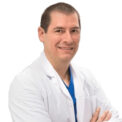Polycystic or multicystic ovaries are those with multiple follicles and must be differentiated from Polycystic Ovarian Syndrome (PCOS) with defined clinical characteristics. The polycystic ovary does not condition the existence of pathology in the ovary or a specific physiological alteration, therefore, it does not have to condition the possibility of achieving pregnancy or generate fertility problems.
In spite of the above, in some cases, women with Polycystic Ovary may have menstrual alterations and ovulation difficulties. Ovarian stimulation can be performed under strict medical supervision, regulating ovulation and scheduling intrauterine insemination cycles. The aim is to improve the chances of gestation (20% pregnancy rate in women under 35 years of age) compared to cycles with Programmed Coitus (6% pregnancy rate).
Polycystic Ovary Syndrome (PCOS) is a metabolic disorder with the usual symptoms being menstrual irregularities, hyperandrogenism, and insulin resistance. It affects about 5-10% of women and infertility occurs due to the hormonal imbalance present in this pathology.
Considering that age is the main factor in terms of reproductive results, it will depend on this to decide on the possibility of performing insemination cycles and on the characteristics of the semen to be able to indicate this technique.
